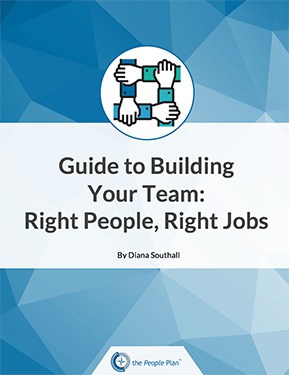This continues my 6 part series on coaching for accountability (you can read Step 1 and Step 2 here).
Step 3 is to start using Action Plans:
6 Steps to Coach For Accountability & High Performance [see all 6 steps on my 1 minute video slideshare].
Most employees (and also most managers) are naturally focused on getting their “day job” done. Their cognitive “time span” and time management skills are typically focused on the next day or next week.
This is a major reason that all your good ideas and wish list of projects for improvement never get very far, much less implemented.
The concept of an Individual Action Plan has personally been an incredible organizing and planning tool for my entire life, and changed the direction of our family business.
When I was in high school, our family business started using a business consultant, who taught every one of our 25 employees how to create and use a personal action plan.
My mother had 3 retail stores, two production facilities and a business services division with hundreds of accounts.
When every person had an action plan and they had “quarterly action plan meetings” they were able to focus on the daily work AND make progress on those pesky projects. It also made it easy to see how everyone was contributing and working together on business building activities.
It made the difference between chaos and progress, and transitioned us from overwhelm to a professionally managed profitable business.
There are two inter-related purposes for action plans-– the first is to monitor and prioritize activities that support major projects or programs. The second is to use action plans as a training and development tool. I say inter-related because when people contribute to projects this contributes to their skill and competency development.
Your employees want and need ongoing reminders and assistance with taking action on bigger projects, so that they make progress and focus on small steps every week.
When they have a written action plan, and they review in your weekly coaching conversations, this helps them stay on track. If you don’t review and hold them accountable to make progress, anything beyond daily urgent work gets forgotten.
Quarterly Action Plans Overview:
Ideally you need to do a bit of design and discovery to begin the action plan process.
- First you need to compile a full list of all active company-wide projects and create an action plan for each, with sections or tasks assigned to the responsible person. [More than 4 projects— prune the list down.]
- Second, you should meet with everyone individually to discuss their desired training and development direction [part of your annual performance conversation.]
- Both of these topics become action steps on an individual quarterly action plan.
What goes on an action plan?
- Specific training for the quarter- aligned with personal interest and business need
- Stretch assignments– areas where this person can enrich or enlarge their job duties beyond the current role
- Delegation items to take over responsibility from peer or manager
- Action items or steps from company-wide or department projects assigned to this person
- Cross-training to “back up” or shadow someone
- Research opportunities– what problem can they investigate possible solutions?
- Outside/ formal training programs or workshops, such as industry certification or a job-related degree
Action plans also need to list specific action items, aligned with a broader goal, who is responsible, and a target date for completion.
They are an integral part of aligning every team member’s work with the business goals, and to leverage the rhythm of weekly coaching with progress on business-improvement projects.
As an added bonus, you will be building trust and the engagement of your team by focusing on the key drivers of retention. With the right topics and agenda, the quarterly action plan meetings become “stay interviews”– a technique that employers are finding valuable to hold onto their high performers.
Next Steps:
Watch my 21-minute video training on Action Plans for Training & Development
Next step I will share details on Step 4 “Delegate, Don’t Abdicate” [see all 6], and expect to have a new Guide to Coaching for Accountability by the end of this month.




